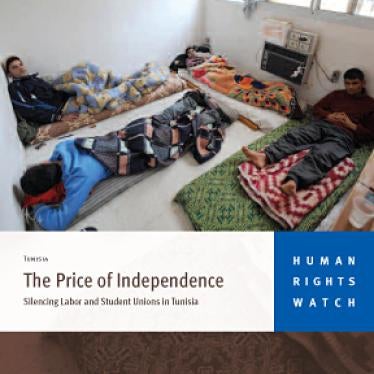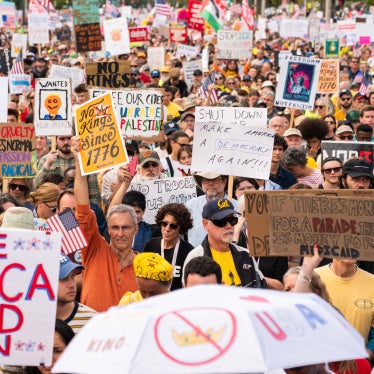An abridged French translation of this article was published on LeMonde.fr on November 9, 2010.
In 2008, miners in Southern Tunisia (Gafsa region) demonstrated the power that unions could have to demand their rights. Led by charismatic trade union leaders, thousands of unemployed workers demonstrated intermittently for seven months, demanding an end to the nepotism, underdevelopment, and poverty caused by government neglect. For seven months, Tunisia saw a mass mobilization unprecedented in the 23 years of President Zine El Abidine Ben Ali's uninterrupted rule.
But instead of the government listening to the cries for justice and reform, its response was to arrest more than 300 people, including the journalist Fahem Boukaddous, who currently languishes in the civil prison in Gafsa, sentenced to four years for his reporting on the situation. In what the pro-government press claimed was a grand show of generosity, President Ben Ali later conditionally pardoned the trade union leaders, after public outrage showed no signs of abating. Those conditional pardons, however, mean that something as trivial as a traffic violation could land them in prison again to serve the rest of their sentence.
It is no wonder that the Tunisian authorities feel the need to exert their control over independent trade unions, which suffer the same consequences as any other Tunisian civil society organization that shows any sort of dissent: they are pressured, and sometimes beaten. No independent unions exist outside of the national union's umbrella. The only independent union, the National Syndicate of Tunisian Journalists, didn't stay that way for long. In early 2009, it released a report critical of the government's ubiquitous and often repressive control of the media. Later that year, the authorities finagled to replace the union's board with one loyal to the government.
On October 21, an appeals court in the city of Monastir, Tunisia, postponed the review of the convictions of five student union members from the Mahdia branch of the University of Tunis for the fourth time, the very same day Human Rights Watch released a report in the capital on the plight of unions in the country. The government arrested the students, charged them with assault and destroying property during a demonstration in 2007, and sentenced them to one year and eight months in prison. Their real "crime," though, was staging a peaceful protest of the university's refusal to allow them to hold their union's annual congress.
The conviction of the five Mahdia student unionists is not an isolated incident. Members of the politically diverse and active General Union for Tunisian Students, founded in 1953, have long suffered the - often violent -- wrath of the government. Dissent has always begun on university campuses; the Tunisian authorities are cutting off the blood supply for an active civil society at the source.
Such a scenario is common in Tunisia, where the appearance of upholding the law supersedes its actual application, and where the judiciary makes a show of trying cases whose outcomes have already been predetermined.
As in any dictatorship, political pluralism, even in the form of labor unions, is a threat. Officially, the government merely requires any new union to submit its bylaws to the local governor. The authorities are required by law to issue a receipt. In practice, however, the government has used this requirement as a convenient way to keep groups from achieving legal status. The authorities either refuse to accept the applications, or do not issue the receipt.
When Human Rights Watch asked the government in September for clarification about why the Tunisian General Labor Confederation is not considered to exist legally, the government predictably replied that they had never received the group's dossiers.
In October 2009, a Manouba court sentenced 17 students to prison after police violently broke up a sit-in to protest the arbitrary denial of housing to a group of female students. This month, plain-clothes police brutally attacked students in Sousse at another peaceful sit in over rights to university housing.
Since 2000, the public University of Tunis has expelled over 50 students for student union activities. When we ask the government about these incidents, not only does the government deny that any demonstrations actually happened and claim that all is well on Tunisian university campuses, but it also insists that security forces arrested all of the students solely for crimes such as assault and destruction of property. One can't help but wonder what it is in the Tunisian education system that produces such violent mobs.
Every time I visit Tunisia, I am overwhelmed by how resilient activists, young and old, remain in the face of such soul-crushing oppression. They are also painfully aware that their government's human rights abuses will continue to go unnoticed and ignored because of the trade and counter-terrorism alliances it has made with the capitals of the US and the European Union.
The irony, however, is that those same capitals that pay lip service to human rights and democracy worldwide are also the ones that continue to support dictators like President Ben Ali across the region-- except when they fall out of political favor, of course.
........
Rasha Moumneh is a Middle East and North Africa researcher for Human Rights Watch, based in Beirut, and the author of a new report, , "The Price of Independence: Silencing Labor and Student Unions in Tunisia."







